A Guide to Reading Comics: Where to Start?
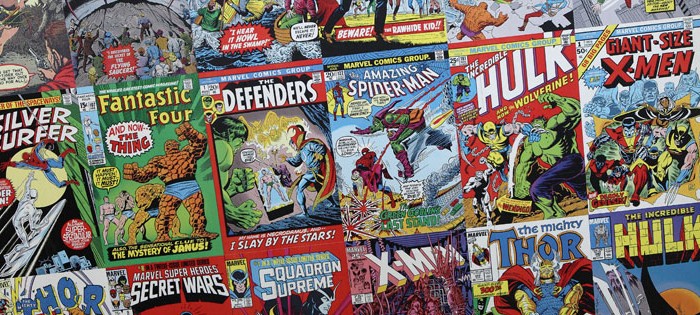
Did you ever want to get into comics, but did not quite know how? There are endless amounts of comics, ranging from genre to genre and where to start can be quite overwhelming. Especially, if you do not know much about them and do not have anyone that can teach you the do’s and don’ts. Comics are a blackhole, in a way, and you can be sucked into a community that already knows what they like and do not like; but alas, I am here to save the day — well, attempt to. In the recent years, more comics have expanded and they are not just superheroes comics like the majority of the popular comics were for baby boomers and millennials.
In the recent years, comics have expanded and they are not just superheroes comics like majority of the popular comics were for baby boomers and millennials. Around the time baby boomers had comics, Batman and Superman were just being created and were something that was dominant in the scene of comics. Nowadays, you have comics like Saga and Sex Criminals that have made it to the forefront and they are nothing like a superhero comic. There are also conventions that support this idea as well and lead to an even bigger stance in the community of comics.
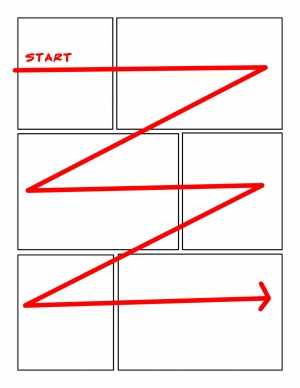
What comics are going to be mentioned are not only superhero comics but comics for readers who do not necessarily enjoy superhero comics. If Captain America is not something for you, then not to worry. Although, the superhero comics will be dominant — there have been many other genres of comics under Marvel, Image Comics, Vertigo Comics and etc. They have made their way to the forefront recently.
Let’s begin with what comics are as a buffer. Comics are a medium in which you express your ideas through art combined with text and other visuals. They are often in the form of juxtaposed sequences of panels and images. In the picture to the left, it gives you a rundown of how to read comics. Now, this is the standard way. Some artists and creators do change that up, depending on what you are reading and what they prefer. However, that is the standard way one would read a comic.
Now that we have that covered, let’s start with what comics you should start with if you want to start reading.
Marvel / ‘Ultimate’ Marvel[10]
Good ol’ Marvel Comics or Marvel Publishing, if you will. I’m sure you’ve heard of Marvel; even without being in the comic book community. Marvel has come into your peripheral. One can assume it was the Marvel Cinematic Universe that caught your eye. The movies have become bigger and bigger in the recent years. Alas, the movies had to derive their content from somewhere and that somewhere is comics.
Here is some background information just in case you want to know where your newfound gems are going to come from. Marvel started in 1939 as Timey Publications; however, by 1950, its named changed to Atlas Comics. In 1961, creators such as Stan Lee, Jack Kirby, and Steve Ditko created the masterpieces we know such as The Fantastic Four, Iron Man, Spiderman, X-Men, Inhumans, and etc. Many of these, which will inspire generations of comics to come. They also provide good places to start, some of them are mentioned below in greater detail. But, first let’s touch on Ultimate Comics and what Marvel has done with the new millennial if you would like to look into that as well.
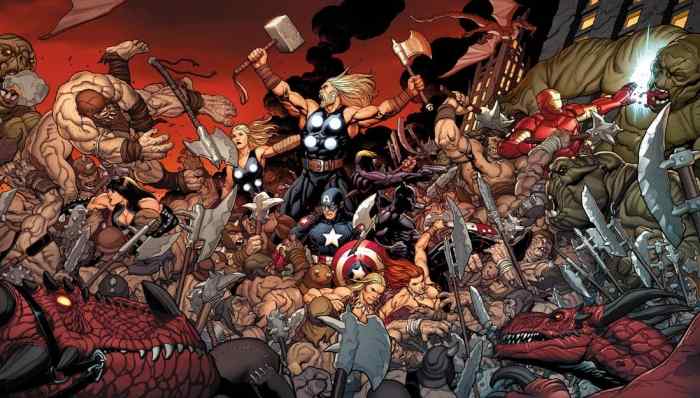
Ultimate Marvel was aimed towards millennials; it is a generation of comics made in 2000 to 2015 to represent updated versions of the superheroes that were previously different. You will realize that when you read how many of the plots actually were compared to how they are now when you continue your endeavors. What you have under this imprint of comics are: “Ultimate” in the name, such as “Ultimate Spiderman,” “The Ultimates,” and “Ultimate X-Men,” and etc. The characters that exist in these comics are ones that don’t necessarily exist in the regular Earth-616 Marvel Universe, which is the default universe most comics are in.
Where to Start?
Now, you might be asking why I am talking about such old comics in 2016. The answer is simple, the original origin stories have derived from what is being mentioned below. So, if you do decide to get into Spiderman from 2008, then the origin is similar to where it started. And, they say, if you don’t like an origin story of how it began there is a high chance you will not like it in the long run. No matter who creates it and changes it and makes it their own. All origin stories are quite similar to where they began, and what is better than to start at the beginning and then choose from there on out if you want to read other versions of that comic.
So, where do you start? That’s the ultimate question. Well, let’s start with Spiderman.
Spiderman[1]
The Amazing Spiderman began in the 1960’s; this was where it all began. It was not a full series when it originally started out. Once comic readers got a whiff of it though, it was created into a full series in 1963.
Peter Parker changed the way comic readers were looking at comics. The comics that were being published at the time were comics such as Hulk, Fantastic Four, and Ant-Man — all sidekick type comics. Spiderman was one of the first characters that was not a sidekick, however simply a high school teenager fighting crime on his own. Spiderman, in a sense, started the non-sidekick superhero fad. And for that, we do thank him.
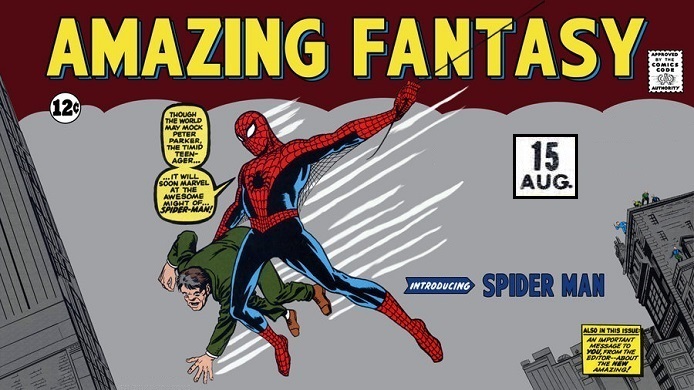
Amazing Fantasy #15 was the mini-series that Spiderman was featured in. The comic was canceled. That was the last issue before it’s departure and if not for that moment, we would not have gained such a diverse and successful Spiderman series.
The original plot goes a little something like this: Peter Parker goes to a high school called Midtown High, where he is a ‘gifted’ science student and on his way to college with a full scholarship. Peter Parker was a confident young fellow, confident enough to ask girls on dates. He often faces rejection because he is perceived to be a nerd. While attending a demonstration on radiation, he is bitten by a radioactive spider — that immediately dies afterward. Peter starts feeling ill and leaves the demonstration, almost getting hit by a car by making a leap into the air. By instinct, he lands on the side of a wall and clings to it. He realizes what abilities he has and realizes that they include speed, strength and the agility of a spider.
Peter decides that he wants to test out his newfound powers and so he decides to fight against a wrestler. Peter is wearing a mask, just in case he loses. But, he quickly beats the pro wrestler and wins the prize money. A TV producer finds him and thus begins his TV career. As he is on set a criminal passes / runs by Peter. Being famous results in Peter Parker becoming arrogant and not necessarily caring about anyone, but himself.
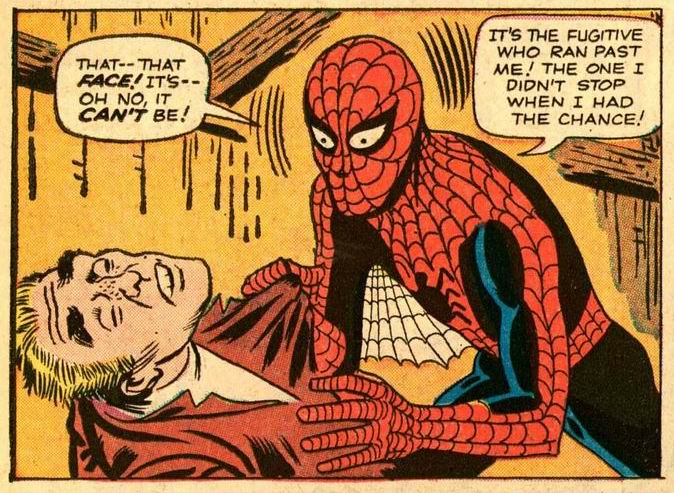
He says “Catching criminals isn’t what he’s paid to do.” Coming home from a gig, Peter notices the police at his house and realizes that the burglar from earlier was the one who killed his Uncle Ben. Realizing that he could have saved his Uncle from being killed if he wasn’t arrogant and selfish, he starts to become a hero, “With great power must also come — great responsibility.”
This results in Peter becoming a neighborhood hero, as opposed to a vigilante. And, thus, he begins saving the world from enemies. He also created a “Spider-Tracker” to which he can spider-sense his enemies better and track them down. As the years go on, he meets his three loves — two of which you might have heard of. The first one is Betty Brant, they split and then he goes to college and that’s where he meets Gwen Stacy and Mary Jane Watson.
Throughout this series, you also learn that his parents were CIA agents who were killed by enemies of the U.S. It was also added that his parents knew Nick Fury and even encountered the Wolverine on a mission. He later went on to have multiple TV animation series’ as well as live action series’ and even spin-offs as well as other comic endeavors. This has led up to what we have encountered of who he is now and how he has changed. Those include Miles Morales and a new version of Peter Parker.
Hulk[2]
The Hulk was one of the first superheroes who also came upon the scene of comics, a year before Spiderman made his appearance. Created by Stan Lee and Jack Kirby, his first appearance was made in 1962 in the Incredible Hulk #1.
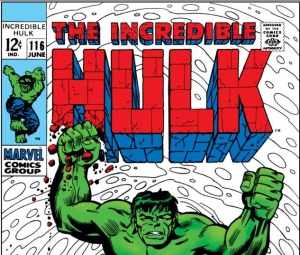
Bruce Banner is the son of Dr. Brian Banner who was an atomic physicist and mother Rebecca. His father Brian hated him. Brian was an alcoholic and a very angry man. Because his mother Rebecca loved him so much, Brian was prone to jealously. Brian even believed that radiation had altered his work and gave him a mutant son. So, Brian then abused Bruce and finally murdered Rebecca, and was ultimately placed in a mental hospital.
He was then left to live with his aunt and father’s sister, who understood the great pain that he endured. They raised him as their own child and cared for him deeply. He grew up with him as a gifted and child prodigy from then on. After graduating from a science high school, he studied nuclear physics and became a star student. As an adult, he went to work for the U.S. Defense Department where he fell in love with Betty Ross. And while that was happening, he designed a “Gamma Bomb.”
Going to rescue a student who was stranded in the gamma test site, Banner went in while they halted the countdown. Except, they did not halt the countdown and Banner was stuck inside. Figuring that he would die, no one would even know he went in there. The bomb went off and caused him to transform into the Hulk, a powerful, green-skinned, humanoid.
Avengers[3]
The good ol’ Avengers — now, you may know a little bit about them from the films from the MCU. Fun-fact is that they originally started in 1963 with Avengers #1 — created by Stan Lee and Jack Kirby. Avengers is inspired by the successful DC Comics version Justice League of America, which was created in 1960.
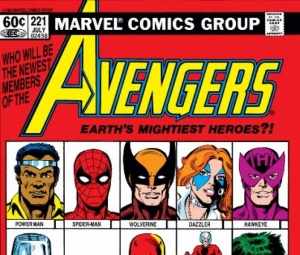
Originally labeled Earth’s Mightiest Heroes, it consisted of Hank Pym (Ant-Man), Hulk, Iron Man, Thor and The Wasp. Captain America joined shortly after 4 issues. What the Avengers did were fought the villains that no one superhero could do on their own. A villain that Spiderman could not take on his own, the Avengers would do that instead. They had their famous “Avengers Assemble!” line that they would say when they were about to fight a villain, which consisted of mutants, robots, humans, aliens, supernatural, and etc.
The Avengers consists of previously created superheroes by Stan Lee and Jack Kirby, and the series was published bi-monthly through issue #6 and then monthly after that until issue #402 (Sept. 1996). Avengers is known for its spin-offs, annuals, and miniseries. Some of those spin-offs include; West Coast Avengers (four-part miniseries), Heroes Reborn, and Avengers vol. 3. Some of the newer versions of the Avengers are The New Avengers, The Mighty Avengers, Avengers: The Initiative, Dark Avengers, All-New, and All-Different Avengers.
The plot of the 1960’s version of Avengers was aimed around Loki. The Asgardian God, who is seeking revenge against Thor. He then leads Rick Jones (A-Bomb, also sidekick to many Avengers superheroes, including Hulk) to collect Ant-Man, Wasp, and Iron Man. This was to help Thor and Hulk who Loki was using as a pawn. The group defeated Loki and Ant-Man stated that they should form a group since they work so well together. So they decided to form a team and that team ended up being the Avengers, whom the Wasp named.
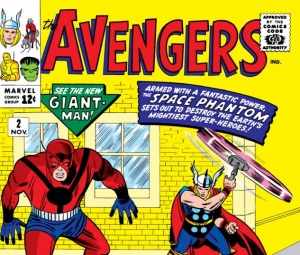
After that instance, the roster changed — Issue #2, Ant-Man became Giant-Man, Hulk left, and the revival of Captain America in issue #4. Cap then joined the team and was given the title “founding member” in the status of Hulk‘s place. They went from them on to fight master’s of evil, of any and all sorts. Another milestone that happened was Captain America‘s resignation, which then Hawkeye, Scarlet Witch, and Quicksilver joined. Giant-Man was now Goliath and The Wasp came back as well. Hercules became part of the team as well, along with Black Knight and Black Widow. However, they did not become actual members until years later.
Spiderman was asked to join, but declined; Black Panther joined after rescuing the team from the Grim Reaper. There was also a crossover with X-Men and the Avengers in 1968, which then introduced Vision. The Wasp and Ant-Man then got married.
Avengers headquarters is in New York City, it is called the “Avenger’s Mansion,” you have good ol’ Tony Stark to thank for that one.
DC Comics[11]
DC Comics, known as Detective Comics, Inc., produces characters such as Batman, Superman, Wonder Woman, Green Lantern, Flash, Aquaman, Hawkman and Green Arrow, as well as many many more on an endless list. They have created teams such as Justice League, Teen Titians, and Justice League of Society. Even villains like Joker, Catwoman, and Deathstroke.
They debuted their first comic in 1935, and Detective Comics was formed by Wheeler-Nicholson and Jack S. Liebowitz. In 1938, DC launched their fourth title which introduced Superman, and it was called Action Comics #1. The first comic book to feature that type of character known as superheroes — and from then on proved to be a sales hit.
There are two significant ages that DC is known for and that is The Golden Age and The Silver Age. The Golden Age is the 1930 to 1950 era of comic books. During this time, comic books were first published and rapidly increased in popularity. Many characters were introduced such as Superman, Batman, Wonder Woman and Captain Marvel (Shazam).
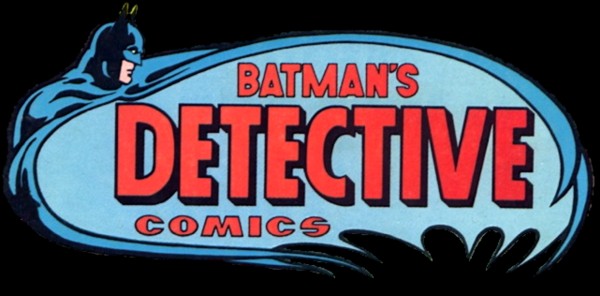
This was the event that debuted the Superman in Action Comics #1 that was mentioned above. Between 1939 and 1941, DC Comics and All-American Publications introduced superheroes such as Batman, Robin, Flash, Wonder Woman, Atom, Hawkeye, and many more ([12]).
Following The Golden Age, The Silver Age was a period of artistic advancement and commercial success in the mainstream version of comics — mostly in the superhero genre. The Silver Age is covered from the period of the 1950s, more accurately 1956 to 1970 and was succeeded by the Bronze and Modern ages. After WWII, superhero comics declined. Comics about horror and crime were becoming more popular in the comic book scene. In 1962, the Justice League of America was created and Marvel followed suit with Fantastic Four ([13]).
Batman[4]
Batman was created by Bill Finger and Bob Kane. Batman’s origin has had countless retellings of it over the years. During the Golden Age, Batman‘s first appearance was in Detective Comics #27. He is a crime fighter, his origin was first introduced in Detective Comics #33 (Nov. 1939) and is explored in greater depth in Batman #47. These two comics state that Bruce Wayne is born to Dr. Thomas Wayne and Martha. They are very wealthy and charitable in Gotham City. Bruce is born into a wealthy, privileged existence until the age of eight. When he was eight his parents were killed by a criminal named Joe Chill, while on their home from a movie. That is the moment that Bruce swears he will get rid of the evil that is instilled in Gotham City. And, take revenge upon the person who took his parents lives.
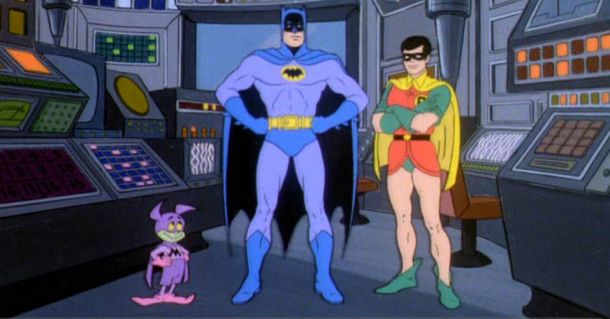
After that moment, he engages in physical as well as intellectual training, but he soon realizes that those will not be enough. He then chooses to make a disguise and takes on the persona of Batman. In the early comics, Batman has a fiancée named Julie Madison, he also takes in Dick Grayson a orphaned circus acrobat, who is named Robin. Batman also becomes a founding member of Justice Society of America, as well as Superman. With that being said, he only participates occasionally and that is what that title implies.
Batman then gets back on the good side of the law and becomes a member of the Gotham Police Department. During the Silver Age, the story was completely changed.
Superman[5]
Superman created by Jerry Siegel and Joe Shuster in 1933. The origin story of Superman is one of the most popular franchises that DC has created. Although the details have varied and changed with each retelling, most themes remain the same like in Batman. Superman was rocketed from the planet Krypton to Earth, where he was found and raised was by a couple in Smallville. While growing up, he develops super-powers and travels to the city Metropolis where he officially becomes Superman and protects people.
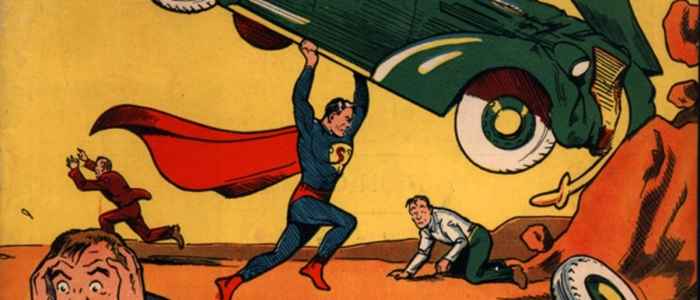
The Golden and Silver Ages have explored their own versions of Superman, which are Earth-One and Earth-Two. He was altered and intensified in 1986 when the Crisis on Infinite Earths, which rebooted Superman‘s history. Thus, Man of Steel was born and revisited the early life of Superman. There was an updated version started in 2004 by Mark Waid called Superman: Birthright. But, this version conflicted with the earlier version and thus another version was made in 2009 by Geoff Johns.
Green Lantern[6]
Green Lantern originated in 1940 by John Broome, Gil Kane, Bill Finger, and Martin Nodell. Green Lantern was another origin story retold several times over throughout the years. During the Silver Age, the first version of Green Lantern was in Showcase #22. Green Lantern was Hal Jordan, who was given a power ring by a dying alien.
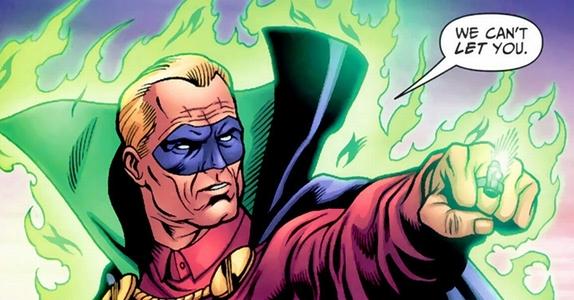
The Silver Age Green Lantern was a special character in the DC family — he was the only one with a family. He has two brothers, Jack and Jim. He has a love interest Carol Ferris, who was in charge of the Ferris Aircraft and Hal’s Boss. Carol preferred Green Lantern to Hal Jordan and took a role is trying to win him over, even proposed to him. Carol was one of the first strong-willed women of authority, which was rare at the time.
The Crisis on Infinite Earths ended and the entire DC Universe went into a different continuity. And, during this time, the characters origin story was retold and expanded into a limited series. The first of these series went into his past about his childhood, brothers, and father.
Other Genres of Comics
If you do not like superhero comics and that is not something you think you are not going to get into in the near future, here are some other comics that are under the science fiction genre. As opposed to the superhero plot. There are comic publishers such as; Image Comics, Vertigo Comics, and Dark Horse Comics. Amongst many more than you can find here. Other comic book publishing companies are becoming more and more popular for readers that do not want to read about Iron Man every week, or Captain America.
Saga (2012 – Present)[7]
It is often to be considered as “Star Wars meets Game of Thrones.” There are also the comparisons between The Lord of the Rings meets Romeo and Juliet. Saga has 33 issues currently.
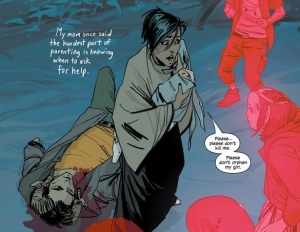
Saga is an epic space fantasy comic book series, created by Brian K. Vaughan and Fiona Staples. It is published monthly by Image Comics. The series is heavily influenced by Star Wars and Brian, the creator, actually created this comic in his childhood. He created this comic in math class, calling it a fictional universe.
Saga is a comic about a husband and a wife from extraterrestrial races, Alana, and Marko, are feeling from authorities. They are also two lovers from different worlds whose people are at war with one another. They are fleeing from authorities on both sides of the galactic war as they struggle to care for their daughter, Hazel. Hazel is born at the beginning of the series, and she occasionally narrates the series as well as an unseen adult. There are also story arcs that happen throughout the series and they all also have different plots as well, if you decide this one is for you to check out.
Black Science (2013 – Present)[8]
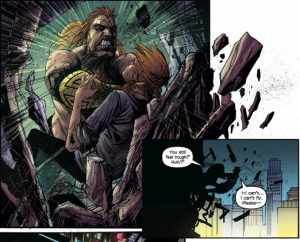
Black Science is created by Rick Remender and Matteo Scalera on Image Comics. The first issue was released in 2013. The story follows Grant McKay, who is an ex-member of the Anarchist Order of Scientists. He has done the impossible: deciphered Black Science and punched through the barriers of reality. McKay and his team are thrown through dimensional barriers to alien worlds while they try to repair the Pillar and return home. The Pillar is a piece of tech that has allowed McKay and his team to travel between the dimensions with the use of Black Science. It is released monthly on Image Comics.
Sandman (1989 – 2015)[9]
The Sandman is a comic published by Vertigo Comics created by Neil Gaiman. The first issue of The Sandman was debuted in 1988. He has appeared in DC Comics before such as Swamp Thing vol. 2 in 1989. The Sandman is a comic about how Morpheus, the Lord of Dreams, is captured and learns that sometimes change is inevitable. The Sandman falls into the dark fantasy genre such as urban fantasy and epic fantasy.
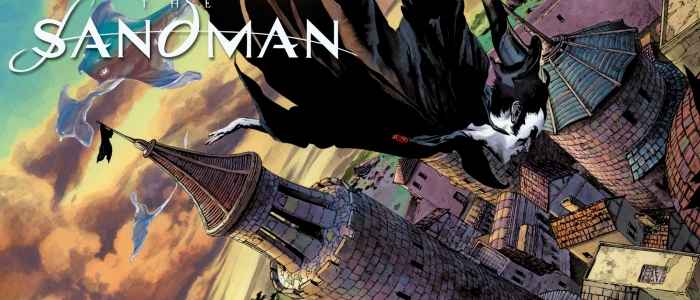
At the start of the series, Morpheus is captured by an occult ritual and held a prisoner for 70 years. Morpheus escapes in the modern day. After avenging himself upon his captors sets about rebuilding his kingdom, which has fallen into disrepair in his absence. The character’s haughty and cruel manner often softens after being imprisoned at the beginning of the series. The challenge of undoing past sins and changing old ways is huge for someone who is set in his ways and has been for billions of years.
Most of the storylines take place in Morpheus’ realm and the waking world — but, they occasionally visit Hell, Asgard, and Faerie.
If this seems like something you may be into, then the next thing you are going to do after reading this article is go to your local comic book store (if you have one). Another comic book community insider I want to tell you about are conventions. Comic-Con, Wonder-Con, and Cons on Cons on more Cons. It is where you dress up as your favorite superhero (or don’t) and be a part of the great community we call a family. You meet the people who create and draw these comics and the entire time you are there, it is like you’re home. What a time to be alive right?
Now, this is not saying that you should absolutely read these comics first — but, this is a good starting point for anyone who wants to start reading comics. The older versions of the superhero comics are where it started. If you get the gist of the personality from those, it does not change too much in newer versions of those comics. There are some you can skip. Instead of wasting your time and reading all of the origin stories that every comic intstills, you can read these few to see if you like and see if they are for you. But, even if these are not for you, there are some others that may be up your alley as well. This is simply to get your comic book wheels turning and seeing what you like out there. Your comic endeavors either start or end here. Whether you like, love, or simply do not want to read one ever again is up to you. But, without further ado, welcome to the community! Just warn us if you are about to scream about a comic you are excited about, so we can pull out our earplugs. We are getting way too old for that.
Works Cited
- [1]: Kistler, Alan. “The Many Origins of Spider-Man: A History.” Comic Book Resources. Comic Book Resources, 27 June 2012. Web. 12 Feb. 2016.
- [2]: “Hulk (Robert Bruce Banner).” Hulk (Robert Bruce Banner). Wikia, n.d. Web. 12 Feb. 2016.
- [3]: “Avengers (comics).” Wikipedia. Wikimedia Foundation, n.d. Web. 12 Feb. 2016. <https://en.wikipedia.org/wiki/Avengers_(comics)>.
- [4]: “Batman Origins.” DC Database. Wikia, n.d. Web. 12 Feb. 2016. .
- [5]: “Superman Origins.” DC Database. Wikia, n.d. Web. 12 Feb. 2016.
- [6]: “Green Lantern.” Wikipedia. Wikimedia Foundation, n.d. Web. 12 Feb. 2016. <https://en.wikipedia.org/wiki/Green_Lantern>.
- [7]: “Saga.” Wikipedia. Wikimedia Foundation, n.d. Web. 12 Feb. 2016. <https://en.wikipedia.org/wiki/Saga_(comic_book)>.
- [8]: “Black Science.” Wikipedia. Wikimedia Foundation, n.d. Web. 12 Feb. 2016. <https://en.wikipedia.org/wiki/Black_Science_(comics)>.
- [9]: “The Sandman.” Wikipedia. Wikimedia Foundation, n.d. Web. 12 Feb. 2016. <https://en.wikipedia.org/wiki/The_Sandman_(Vertigo)#Themes_and_genre>.
- [10]: “Avengers (comics).” Wikipedia. Wikimedia Foundation, n.d. Web. 12 Feb. 2016. <https://en.wikipedia.org/wiki/Avengers_(comics)>.
- [11]: “DC Comics.” Wikipedia. Wikimedia Foundation, n.d. Web. 12 Feb. 2016. <https://en.wikipedia.org/wiki/DC_Comics>.
- [12]: “Golden Age of Comic Books.” Wikipedia. Wikimedia Foundation, n.d. Web. 12 Feb. 2016. <https://en.wikipedia.org/wiki/Golden_Age_of_Comic_Books>.
- [13]: “Silver Age of Comic Books.” Wikipedia. Wikimedia Foundation, n.d. Web. 12 Feb. 2016. <https://en.wikipedia.org/wiki/Silver_Age_of_Comic_Books>.
What do you think? Leave a comment.
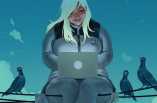
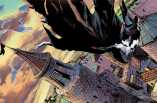
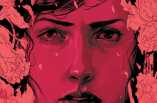
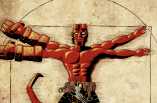
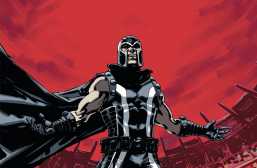
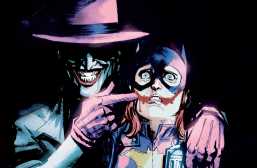
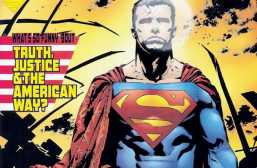
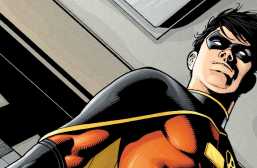
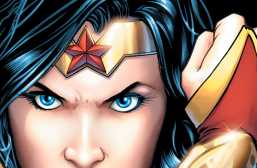
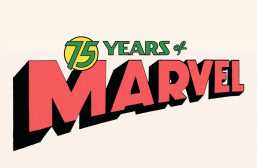
Thanks! This was very helpful for me. I’m thinking of starting to really get into the comic book world. I’ve always been drawn (no pun intended) into comics, with the illustrations, bright colors and the recognition of my favorite superheros. I don’t understand why some comics start a #0 and others at #1? Is there a reason for that?
a #0 issue is an issue that is dedicated to the backstory and just that — information that you need to know about the character and etc., it rarely happens anymore (i don’t see many of them), but back in the day, it used to happen more so. now they incorporate backstories into comics as it goes along as opposed to creating a #0 comic.
I’ll come back and read this later but for me it took a while to get into comics because I’m a cheap bastard who can’t/unwilling to afford 20-40 bucks per novel or $4ish per issue of everything i wanna read. I started by torrenting a ton (blasphemy i know) and then I recently moved to a place that has a hastings which has really great deals on used novels and individual comics. now I try to buy new issues when I can to make up for all the torrenting. anywho… that’s one way to do it. also I started with manga. it’s cheaper and freely available on the internet.
To me that sounds a bit lazy.
I myself has recently been into comics and I find it really entertaining (yet pricey). If you’re into Marvel, try to invest on Marvel Unlimited to catch up on old titles. This is how I did it. And also, keep an eye on discounts at Comixology.
i buy both, paper and digital — but, ludie is right! there’s marvel, image, dc, and comixology apps and they all have deals (quite constantly). there’s also websites you can download them for free even if you just want to check them out beforehand before buying as well. there’s always deals and digital is becoming the better option these days because you can take them on the go and on your phone while you’re out and about!
Avoid 90’s comics.
I’ve tried to get into comics about ten times in my life (from childhood to now). Everytime I pick on up and read it, I find every other panel goes on about something that happened in a previous issue that I don’t have but need in order to make sense of what I’m reading at that moment.
I understand that’s probably the main draw (collecting all them to piece together the whole story), and also a great way to sell comics, but it’s a big turn off for me. It’s the opposite with self-contained hardcovers; I finish and it wasn’t enough content for me! I’ll just stick with regular books, thank you.
And yes, I understand the irony. But Norse Thor would kick Marvel Thor’s ass any day.
just an idea, but they also have graphic novels, which contain all the issues in one. they are pricey about 30-50 bucks, but they are worth it so you won’t have to keep buying issues and getting lost. they normally have all the issues in that #1 graphic novel and then they continue. saves money and the artwork is great! they’re about 300 pages sometimes, and they come with so many issues! but, i understand you — i also read regular books and nothing is like a good ol’ regular book
Its weird right how some of us dont like the whole just pick something and work along the way, I NEED CONTINUTIY, and thats why I also stick to nice organized books which if have sequels are well described and organized just how I like them without overly complicated crossovers
Graphic novels are def something that you might enjoy also! the crossovers in comics are not something you NEED to read. Civil War is important to the Marvel community, but I’ve made it years without reading it until last year. There may be some that are needed, but I’d like to believe comics make it so that nothing is needed to read as far as crossovers and spin-offs
This is the most helpful “How To Get Into Comics” article I’ve read so far! Thanks!
thank you 🙂
Thanks for the breakdown to this fascinating world of comics.
thank YOU for reading it 🙂
Great piece with some interesting information to those who are new to comics. Having two boys, I am very familiar for the most part with superhero comics, but not with other genres. For this reason, I found the section on alternative comic genres very informative. I might look into reading the Saga comics, seems interesting to me.
thank you! i hope you enjoy Saga, it is an adventure of a comic!
How do I know which comic is my starting point to start reading? I mean, (I’m new to this, of course) for many comic book series there are a lot of different collections and some of them are rather old.
Comics normally will start with issue #1 or #0, and those are the start points. If it says “All-New” or “Ultimates” it’s generally another version of the older comic that came before that is / was being made for the generation it came out for. For the most part, you can start anywhere in a Marvel superhero comic. I.E. Deadpool, you can pretty much start anywhere, he tells his backstory throughout the comic (well, brings it up often) With Marvel comics you can catch on fairly quickly when it comes to back story, because it’s retold or mentioned a few times throughout.
I’d suggest just diving in to whatever appeals to you. Don’t worry too much if something came before it too much. Most modern comics are pretty good at telling you what you need to know as you’re reading. But if you’re a bit confused still with your chosen comic then Wikipedia generally has the answers you seek.
That’s what I did when I started reading comics and after a while you won’t need to do as much when you come familiar with characters and concepts.
Wild is right, it all appeals to what you want to read as well. Sooner or later you’ll get the hang of what you want to read and what comics you are stoked for on comic book wednesdays and you may read some that you won’t like in five years, but that’s the experience of comics. you find what you like and once you do it sticks and you have your own little way of reading comics
Great article, thanks. I’m just starting to get back into comics, loved them when I was a kid but stopped reading them the older I got. I really like the darker comics, so I prefer the likes of batman, absolutely love the current games. But I like villains in batman over the hero and I was wondering if there are any comics that focus more on the bad guys than the good guys? I love Harley Quinn and The Joker if that helps any…
YES! Suicide Squad, basically bad guys in general (the comics are cooler than the movie looks), Harley Quinn (she has her own comic, featuring the Joker at times as well), Harley Quinn and Power Girl have a comic as well. Catwoman has a new series. Convergence as well could be something that you could be into. The New 52 is a good series. The Joker can be found in plenty of these making a cameo.
http://www.dccomics.com/comics/harley-quinn-and-power-girl-2015/harley-quinn-and-power-girl-1
http://www.dccomics.com/comics/harley-quinn-2013/harley-quinn-17
http://www.dccomics.com/comics/the-jokers-asylum-2008/the-jokers-asylum-the-joker-1
http://www.dccomics.com/comics/the-jokers-asylum-2008/the-jokers-asylum-two-face-1
http://www.dccomics.com/comics/the-new-52-futures-end-2014/the-new-52-futures-end-1
http://www.dccomics.com/comics/the-new-52-futures-end-2014/the-new-52-futures-end-6
Here are some that you may like, and then you can broad your search after those, but there are some good ones for villains on DC so you are in luck! I hope this helped :^)
There’s lots of comics that focus villains. Harley Quinn has her own series at the moment which is a lot of fun. Last month’s issue (#17) is a great jumping on point. As for the Joker, the best story featuring him is the classic Batman: The Killing Joke, but there’s also a great story now called Joker which is another classic. Other villains with their own comic recently are Lobo, Magneto and Deathstroke.
Also, listen to Hendrickson, Harley’s new series is rad (have been reading it, I can vouch for it)
A great place to start would be to pick up the new 52 Scott Snyder Batman, i would say get enough to read through the Court of Owls arc, and then if you still like it (which who wouldn’t after reading court of owls) then pick up the other 15 or so issues because so far they’re all amazing. Other good Batman reads for beginners would probably be Batman and Son, Long Halloween and Dark Victory (in that order), Year One (It conflicts with zero year since it’s not officially canon, but still a great read), Dark Knight Returns (also another non-canon Frank Miller, but one of the best comics of all time, The Killing Joke, and any new 52 Batman related comics (Batgrl, Batwoman, Batman and Robin Vol.2, Nightwing).
Nightwing is the best, I agree with you the New 52 is pretty killer!
genuinely great article
thank you 🙂
i went into a comic shop once, mention i had at 1 point the first comic with the venom costume. he began saying in a very ass way, that its questionable which is the actually true first comic. i said whatever comic it was in first is the first comic and true origin story. he began to tell me that that comic was a what if. i then said no if it was a what if, it would of been called a what if, like the rest. basically i had someone argue about something not worth it. everything he said was in opposition of what i said. it was almost like, because i wore a tank top, military pants, shaved head and tattoos, that i was ignorant about comics. everyone is a geek about something, like people who are really into sports are geeks. you would think that comic geeks would try to be better then sports geeks. but everyone wants to feel superior to others, dont understand why though. the comic was part of a short series called the secret wars, but since cartoons couldnt use that, they made it come to earth on a rocket. he tried to use that as ammo.
what a terrible comic book experience 🙁
The explanation for how to read it should’ve been done by Deadpool.
i actually wanted to make the entire article in the words of Deadpool haha
Is a subscription like Marvel Unlimited a good way for someone to get into comics?
Yes! I like digital, I think it’s a good way of being on the ‘go’ and actually reading while you are out and about. That is a HUGE plus for me, I always will like buying them, but it is very beneficial!
Or, you can just buy a manga through these simple steps:
1. Go to bookstore
2. Look for 1st volumes of each manga till you find something that is interesting
3.purchase 1st volume of manga
4. enjoy
Comic books are so convoluted these days that it’s practically impossible to actually get started.
Yes, because the tale of a boy using a demon book to kill people with the aid of an apple-eating demon… that then leads to him leading a police task force to hunt him down…
…or of moon princesses who fight weird monsters with the help of a masked waiter (I think that’s his day job, at least)…
…or One Piece (really, do I need to say more?)…
…all those stories are TOTALLY simple and not at all as crazy and complex and convoluted as American comics.
Plus even if he did return her feelings it could not actually go anywhere, I feel that all those stories where they fall in love and get married are actually pretty unrealistic (aside from the fact that it happens within the span of five seconds). While the manga does not up and say it, the fact that every Hyuuga looks like every other Hyuuga means that they practice inbreeding (Incest), as heir to the Hyuuga clan Hinata would never be allowed to marry outside of said clan (plus the elders would never allow the Byakugan to belong to another clan). Not what I posted here was for my fanfic site I can’t remember the author’s name but this is why Naruto’s last movie is about as phony as a FanFic story I want to look up the office name / be given some credit for this but his story is Redux Namikaze if you want to look it up and see who I refer to cuz I would like to get the guy full credit for pointing this out that no one else everyone else seems to ignore with the Naruto series what is the old saying done with the facts yet we have a good story the saddest thing is the man who will now though creating an amazing story and great characters only handle to a bunch of fanboys and fangirls and IRC hope none of these fan boys and fan girls are in love with the actual character I bet you have an iPhone love with the actual actress who voice of the character which I’ve actually seen a photo of her and she is quite good looking just so you know she wouldn’t give you the time of day girls you can tell loser coming from a mile away believe me I’ve been down that road I know all about it so you don’t need to diss me on because I am a loser I won’t deny that it takes to lose the knowing loser and trust me and something I’m not proud of but I accept that but at least I’m not an idiot at least if I was going to do something and stay true to the story and what I haven’t even saw and when I got served unlike a certain fanfic based company that actually of what I heard actually has photos of the character wearing lingerie and even a Playboy bunny outfit I don’t know about you but that seems highly unprofessional and a little immature you know what we’re up guys in act your age not your shoe size I know it’s hard to do but you don’t try ask with forget it do or do not there is no try and show some damn professionalism seriously you guys have a fictitious character wearing lingerie in a Playboy bunny outfit I’m not sure where I should laugh or cry about how about actually pathetic at actually yes actually I’ll just cry my😥 and that’s how you do not do an anime mangia cartoon drawing but to the man who wrote Naruto your story was absolutely amazing characters were creative absolutely beautifully drawn the craft and creation of the way you made it was actually amazing it’s too bad you left your show in the hands of a bunch of idiots when I say idiot I mean adults mentally inferior to a child with information difference the way you can apologize to the Naruto fans is by taking it back and we doing the story as you see it if you truly believe what you said but he had to go back and rewrite the whole number to a franchise and make it so the end up together and don’t say you don’t want to do it because if you don’t it just says you’re lazy and you best we passed the buck I know that you are a better writer than that so please go and do this for the true friends of Naruto and please be consistent I know you probably don’t need this crap or this type of stuff but I would appreciate that someone would take it seriously look if that’s what you intended from the beginning then go back and read make nails or call it naruto reboot if you have to I think you can do it if that’s what your true intentions were but I don’t think that was your true intentions you allowed another company to influence your decision is same company with the season finale of The Legend of Korra also influence the ending of the Legend of Korra based on fanfic of a Asami and Korra
At once shallow, completely haphazardly assembled and written with stellar ineptitude, this alleged article may be evidentiarily cited as affirming in countless readers why they’d be wasting their time if they chose to read those comic books they’ve been hearing so much about. And that’s a shame, almost as much a shame as the artifice of editorial oversight on this site.
This is a very helpful resource. There are so many different iterations of each comic series and character that it is a daunting hobby to get started in.
That is true, alas though, once you’re in you start to get your own mojo and what you like and what you don’t like and what you want to read and that is one of my favorite things!
I learned something today… damn it!
It’s a never-ending story where the characters are always getting reboots when their story start getting boring. You don’t really see the characters evolving as human beings, but rather getting their story retold over and over and over… That’s why I like Deadpool because he doesn’t really any of this crap.
#supportdeadpoolforpres
This is great and I’ll be sharing this around my social media places.
thank you 🙂
Most people say to buy the new series that Marvel and DC make but to never buy the A-list ones, i personally disagree, despite titles like “X-Men” and “Superman” having been around for decades, there’s not any actual need to read the older comics, because comics are always having new storylines that are created independently from older ones.
Is comic continuity confusing? Yes it is.
Do you need to understand the continuity to understand the plot? Not really.
That’s true, I mostly just suggested them for the backstory as well as seeing where that “superhero” dynamic came from. the backstories are almost always the same unless the character changes gender and even then they kind of are. But, it shows that the distilled version of a superhero is also the same, it hasn’t really changed much even from 1960 and I think that is cool to learn and appreciate as well!
actually a pretty decent rundown. reading the DC and Marvel wiki’s can also shed some light, but you’re bound to run into some heavy spoilers that you might not want to know, or you’ll see things that just don’t match up with the era you’re reading.
That’s what I used to do at times, it makes it so you don’t have to read the entire thing and the good thing about Wiki is that it has paragraphs for certain comic series, so hopefully they don’t spoil too much
Fan wikis are often even more in depth too. Personally, I wouldn’t worry about spoilers for American comics since sometimes a storyline will end in a different book or even get forgotten about so who knows when you might run across it.
A very nice intro. I might try SAGA. Thanks!!!
I hope you like it 🙂
While this article has been immensely useful in giving a perspective on the methodology of reading a comic, and gave a starter’s entry into which comics a lay-person can begin from, I do have some questions to ask regarding your article.
For a start, I noticed that you didn’t add entries of Vertigo and Image comics in your article. Or even some well known British comic icons. While the article itself is focussing on the original hub of comics from a story-arc perspective (and hence is probably excluding panel comics like Popeye, Dagwood, Garfield, B.C. and Charlie Brown), It would have benefited from having (at least) Judge Dredd (https://en.wikipedia.org/wiki/Judge_Dredd) and Hellblazer (https://en.wikipedia.org/wiki/Hellblazer). I also find it interesting that you didn’t include The Punisher (https://en.wikipedia.org/wiki/Punisher) as well – I would like to know your perspective on these comics and why they were not included, since you have already mentioned Vertigo and John Constantine is their flagship character.
Furthermore, a little more detail regarding comic book tropes (two page spreads, inking type, narration styles) would also have been beneficial to this article. Maybe there is another article on these tropes on The Artifice and I don’t know about it? If so, where is the article?
Lastly, and this is me being honest: I actually liked how you gave a very neutral perspective on the introduction of comics (or story arc based comics, at any rate – hero or no hero) for the reader to examine and consider. Even though I have comics in their traditional magazine form (as well as a few trades), I find that there are websites where you can read comics online (comicmad for instance).
I look forward to your response.
honestly, it would’ve been way too long if i wanted to add everything i had hopes for unfortunately :/ i had to cut a lot out, i would hope someone adds a part 2 for this that shows the basics of how to read an article and etc., i tried to get most of the general things down, but it was getting pretty long as it was. i wanted to add fight club 2 and paper girls and some neutral mature comics as well. Archie and Peanuts to show the differences too! i have been trying to answer questions as far as what else anyone wants to know since i know i couldn’t add very much in this. i tackling on a bunch of topics in this article.
I do know about Vertigo and Dark Horse etc., but i presume the basis of me mentioning Image it would start a chain reaction in the audience searching up the others as well since i couldn’t add everything i intended to. i know about all three of those comics you’ve mentioned, which are also good areas to start. thank you for mentioning them! hopefully, people will cruise down the comments and see this one.
*an comic, not article sheesh
So, so helpful. I love this!
Thank you! 🙂
After years of reading manga and the occasional graphic novel, I’ve started to get into comics a bit more. And while I wouldn’t exactly call DC’s New 52 easy to pick up, it’s certainly more accessible to me than say the previous 52 run or the Batman RIP arc. I mostly still just collect trade paperbacks of the main series, but I have also widened my base through Comixology, much to my wife’s chagrin (they were having a flash Flash sale, how could I resist!). I’ve still yet to attempt to crack Marvel’s Superior Spider-Man/Death of Peter Parker/Ultimate Miles Moralis Spider-Man. But I do hope to eventually.
Ebay will be your best friend as well, if you want paperback copies; they sell from old to new to not even released yet comics and it’s really cool i’ve ordered a bunch from there when i can’t find certain old school comics in the comic book store!
One of the best articles here. Brilliantly done!
thank you 🙂
Thank you so much or this I’m going to bookmark this page to use in the future.
You should do one for every nerdy/geeky subject.
Alas, I do not think that “alas” means what you think it means …
as a form of exclamation?
“Alas” is used as an expression of grief – a good synonym would be “unfortunately.” For example, in your first paragraph, I’m not sure you meant to say “unfortunately, I am here to save the day” … I mean, as a comic book novice, I personally found your article to be quite interesting and not at all unfortunate 🙂
haha thank you! I meant it more towards a form of exclamation, I guess nowadays it’s used more towards that. (I had this talk with a few of my professors, I’m an english major myself) and how words are changing into different meanings. But, you are right! The original definition is grief!
Well, I agree with your suggestions.
I’m… Impressed. I was expecting this to be some sarcastic, back-handed satire, but this is actually really helpful and informative. Kudos!
I used to get individual issues until I realized it’s crazy expensive. Now I buy trades on Amazon for $10-15 each. They’re a lot nicer to look at, substantially cheaper, and easier to keep track of all the issues needed to follow a particular story arc. I do miss going to the comic shop though.
I am teaching a Comp 2 class this semester designed around reading and analyzing graphic novels. Since most of my students are complete novices when it comes to comics, I found it to be essential to teach them how to read a comic. Apparently for some it’s not as intuitive as I would’ve thought. I heard several comments when I gave them Jessica Abel’s “What is a Graphic Novel” comic say, “where do I look first”.
You forgot a final piece of advice: NEVER go on the internet. Just… don’t. You will be much happier just reading the comic then reading what reviewers, angry fans, Marvel Zombies and DC Devotees are all screaming about.
This was great! Very informative for first time comic readers.
Great post! I’m very new to the world of (Western) comics as I’d only ever read manga before, which are relatively straightfoward. Suddenly there were so many different universesn runs, people working on them, not to mention retcons and I felt so overwhelmed. I’ve been trying to cope by following certain characters I like, in addition to recs and explanatory posts like these!
Wonderful post. I took a class in studying comic books as a creative medium, but I haven’t read that many beyond school assignments. I’m personally intrigued by Saga and Sandman, which I’ve heard about before.
Very good article. I like how you introduce the comics to the medium too, it’s a rising medium, I think, especially these days. DC is the best.
This essay is helpful. We need more lesson plans and guidebooks for college courses in literary studies about comics.
we do, I took a course on how to teach graphic novels and comics in the classroom and it was one of the best courses i’ve taken in college!
I loved the Sandman series. Good article!
I really want to read Saga!!! But this is very useful because I think people find it hard to be a comic book fan when there is such a massive back catalogue they don’t know where to begin
Great article. As some who’s about a year into being into comics, this really helped me out to discover more stories I’ve missed.
Unsure if I missed in the article, but for anyone starting out I’d suggest any classic Batman stories, especially those done by Frank Miller like Dark Knight Returns or Year One. Even The Long Halloween by Jeph Loeb.
I appreciate the focus on comic books outside the superhero genre. Some of the best comic books I’ve read have been crime comics (100 Bullets, Scalped), horror comics (Wytches) and sci-fi comics (Fear Agent, plus Black Science and Saga, which you mention).
Regardless of personal taste, comics are a fantastic storytelling medium, and they offer something for everybody!
Thank you very much for sharing this post. I love to read comic books and all these comic book series are my favorite.
I would definitely also recommend the Miracleman series, originally written by Alan Moore. His penchant of deconstructing superhero norms, which would reach its pinnacle in works like Watchmen and V for Vendetta, all began with the exploration and reinvention of a Captain Marvel/Shazam-style of character, and what it would actually be like, in the real world, to have powers that make you a virtual god.
I was thinking of starting reading some of these comics but some of the origins are not really in my budget. Superman’s first appearence (Detective Comics 1) is like 2mill to buy. Some other old pieces are very expensive as well so… Not all origins are that available